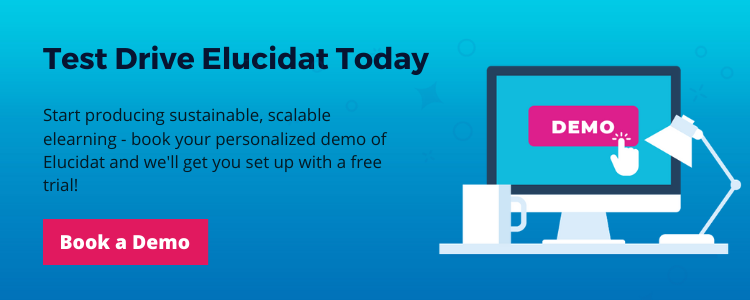Why subject matter experts are key to scalable elearning
6 minute read
Elearning Subject matter experts (SMEs) are essential to L&D’s success. From understanding the context to developing the content, they shape your learning solutions. But their role doesn’t have to end there. With skill gaps and training needs on the rise, many L&D teams are looking for new approaches to meet demand. We spoke to L&D leaders from a number of large, global organizations to find out how they involve subject matter experts in successful elearning production at scale.

Why subject matter experts are essential to design elearning at scale
Changing customer expectations, digital transformation and increased regulation have left many businesses facing skill gaps. L&D is key to overcoming these issues, keeping pace with change and making sure businesses and employees have what they need to thrive. But L&D teams are struggling to keep up with the demand and the list of training requests continues to grow. If they want to avoid becoming a bottleneck, a new approach is needed.
For many large, global organizations, this has meant subject matter experts playing a bigger role in learning projects. Rather than just providing content, SMEs are becoming elearning authors. And with the help of rapid elearning authoring tools, the L&D teams we spoke to were seeing lots of benefits to this approach:
- Directly harnessing specific expertise areas
- Ensuring learning is relevant
- Responding to emerging skill gaps more quickly
- Unblocking L&D workflow so the team can focus on strategic oversight
- Supporting truly scalable elearning production
What to consider when getting subject matter experts involved in authoring online learning course
Of course, it’s not just a case of handing out authoring tool licenses and waiting for the results. Before you get your subject matter experts producing elearning, you need to set them up for success.
Here are three key factors you should consider:
- How can you best use your SMEs’ time?
SMEs need to do their day job alongside their new elearning author role. Some may only produce elearning once a year. If you’re going to sustain their interest and keep to project timelines, you need to provide the right level of support and avoid overwhelming them. - How can you help SMEs produce effective learning?
SMEs are content experts, not learning designers. They’re also used to sharing their expertise face-to-face, rather than digitally. No one wants to rework unengaging and ineffective elearning, so you need to provide a framework that empowers SMEs to produce quality straight away. Learn how to leverage your subject matter expert to build your dream elearning team. - How can you maintain oversight and quality?
Getting lots of different people from across your organization involved in authoring elearning can lead to a wide range of results. If you’re going to maintain consistency, you need to put a robust process in place.
How are other organizations setting subject matter experts up for success?
Whether starting out or well on their way to getting subject matter experts involved with elearning authoring, the L&D leaders that we talked to had many shared experiences, challenges, and successes. Every industry and organization may be different, but all these L&D teams highlighted the same four steps to help keep subject matter experts and elearning production on track.
1. Decide on your approach first
Don’t rush ahead and get SMEs creating elearning before you’ve decided on the approach you’re taking. Whether it’s design principles or a governance model, all the learning leaders we talked to said deciding on their approach upfront made it a smoother journey to elearning production at scale.
2. Provide an onboarding package
Get off to the right start by onboarding your SMEs. The aim is to get SMEs engaged and feeling comfortable with the project, rather than overwhelmed with technical details. From a short kick-off meeting to a design hub full of inspiring best practice examples, these L&D teams used a full range of onboarding tools to do this.
3. Take steps to maintain quality
Onboarding is just the start. You need to provide SMEs with the right level of support throughout the project to ensure quality and consistency are maintained. Many L&D leaders were directly involved in key approval stages, but they also used templates, guidelines, and peer reviews to keep SMEs on the right path.
To streamline this process, you can explore these free elearning template designs that will save you (and your SMEs) hours.
4. Create momentum
L&D leaders who were further along in the process of scaling up elearning production found that their SME successes organically fed back into the process. As the number of elearning champions and author community grew, so did L&D engagement levels and their learning culture.
Explore more ways how you can transform the way you work with your subject matter experts.
Revolutionizing SME authoring at Decathlon: A case study
Decathlon, a leading global sports retailer, embarked on an innovative journey to transform its learning and development (L&D) approach. The mission was clear: empower every employee to shape their own career path through autonomous elearning creation.
The initiative began with a select group of content creators, which then rapidly expanded to a wider employee base. Supported by straightforward onboarding and guidance, these new elearning authors were given the freedom to create, adapt, and share courses globally. This approach enabled Decathlon to:
- Overcome geographical and sectoral learning barriers.
- Foster a sense of ownership and autonomy among employees.
- Facilitate easy course adaptation, ensuring relevance across different regions.
In just one year, this strategy led to over 1,000 employees in 41 countries producing nearly 5,000 courses, accessible to more than 90,000 learners. The result was not just an increase in learning content but also a boost in employee engagement and skills development.
Subject Matter Experts and the future of online learning
Subject Matter Experts (SMEs) are set to play a pivotal role in shaping the future of elearning. Their involvement is key to enhancing both the capacity and quality of learning content. As highlighted in our State of Digital Learning Report 2024, SMEs are driving significant advancements in online learning. Here’s how:
Increasing L&D capacity
By getting involved in content creation, SMEs help L&D teams scale up their training offerings without compromising on quality. SMEs can efficiently turn their expertise into learning modules, easing the workload on L&D professionals.
Enhancing content quality
The depth of knowledge SMEs bring is invaluable in crafting high-quality elearning content. Their insights ensure that the training is not only informative but also deeply aligned with real-world applications.
Bridging knowledge gaps
SMEs are instrumental in identifying and closing knowledge gaps within the organization.
Their expertise can directly address specific learning needs, thereby enhancing overall employee competence.
Boosting employee retention
Engaging and relevant training content, developed by SMEs, can significantly improve employee retention. Tailored learning experiences make employees feel valued and invested in their professional growth.
The integration of SMEs into elearning represents a significant step towards more dynamic, effective, and personalized training solutions, crucial for the future of workplace learning.
In summary
If you want to stay ahead of training demand by scaling up elearning production, you need to involve subject matter experts. Getting SMEs onboard, engaged and producing effective learning isn’t straightforward. But the effort you put in at the start will pay off with a smoother production process. And, ultimately, this will lead to your team better meeting your organization’s current and future learning needs.
We spoke to L&D leaders from a variety of industries who have put this approach into practice. Although they used different models and tools, they all highlighted four key steps to setting subject matter experts up for success:
- Establishing a clear approach from the start
- Getting SMEs on board without the overwhelm
- Providing the right level of support to maintain quality
- Enabling your SMEs feed back into the process with peer support
Want to hear more examples of how these L&D teams set their SMEs up for successful elearning production? Download our SME best practice guide.




